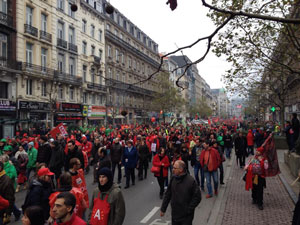Full success for the national demonstration on 6 November. With more than 120,000 participants coming from the whole country the event which had been initiated by the three main workers organizations (Christian, socialist and liberal) makes up the largest social mobilization for the last 30 years.
Trade unionists, politically left activists, associations or ordinary citizens went out on the streets of Brussels. Isolated violent acts at the end of their route did not overshadow their basic demands: radical reorientation of the new right-wing government led by the liberal Charles Michel.
This mass success is nothing else but the reflection of the wrath caused by the novel attacks of the coalition in power against the social achievements. Whereas the cost cutting plan over 11 billion Euros spares the big business it addresses the rest of the population: Rise of indirect taxes, drastic cuts in health care and public services. Other measures intend to destroy the grounds of the Belgian social model, like the rise of the legal retirement age from 65 to 67 years, the suspension of automatic wages-linking to inflation, or the reduction of employer’s contributions that could lead to endanger the sustainability of social security. “A list of trophies for employer’s lobby”, says M. Marc Leemans, president of the Confederation of Christian Trade Unions.
This crusade against the welfare state comes to happen in an equally novel political context. For the first time since 26 years, the social-democracy is excluded from power at the national level. It is the result of the will of two political parties to break with the tradition of consensus that generally prevailed in the Kingdom. On the one hand, the Niew-Vlaamse Alliantie (N-VA, Independantist Flemish, right-wing) who, under the pressure of corporation unions, agreed to postpone its institutional program to implement its neoliberal agenda. On the other hand, the Mouvement Réformateur (MR, liberal French-speaking, center-right), who chose, with only a quarter of French-speakers votes, to take the head of a government clearly dominated by the Flemish parties.
This asymmetric configuration lead to a radically different perception of governmental action in different linguistic regions. Indeed, the government benefits of the consent of 58% of the voters in Flanders but only 32% of the French-speakers of Brussels and Wallonia. However, the massive and unexpected presence of demonstrators from the North side of the country must sound like a mockery for the Flemish nationalists, who use to replace socio-economical debates by the linguistic question. This development can also open positive prospects for the future of social struggle, with the national strike of 15 December as its climax.
